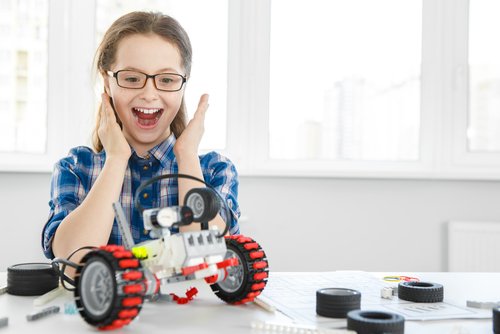Ideas for Stimulating Gifted Children


Reviewed and approved by the psychologist María Alejandra Castro Arbeláez
Unfortunately, gifted children don’t always receive learning opportunities that match up with their cognitive level. This, of course, is a source of worry among parents. That’s why we want to provide you with some ideas for stimulating gifted children in this article.
The desire to keep children stimulated so that they can reach their full potential is the first step. It’s also very important to figure out what activities your child enjoys, is interested in, and feels challenged by.
You should never forget that the key to raising gifted children is respecting their uniqueness, opinions and ideas. At the same time, parents need to support their children, as well as be receptive and flexible.
8 ideas for stimulating gifted children
Below we’ll suggest ideas that you can keep in mind when it comes to motivating and stimulating gifted children:
1. Encourage their passions.
Our first suggestion is that you respect your child’s interests and passions. Remember that gifted children need to have a say in what they’re learning.
It’s great for children to learn about things they’re passionate about and then share that learning with you. This will appeal to their creative side and reaffirm their understanding.
As parents, if we don’t respect the interests of our children, we may cause them to lose passion rather than motivating them.
2. Establish goals
The goals you establish should have to do with your child’s passions and desires for them to be meaningful. They should also be short term and measurable so that your child can appreciate his or her achievements.
Allowing children to establish their own objectives can help them find the motivation to go after new goals.

3. Work on their perfectionism
Perfectionism is one of the characteristics that often defines gifted children. This may cause them to establish unattainable goals that are impossible to reach. As a result, these children may develop a constant dissatisfaction with their achievements.
Parents need to show their children that they love them for who they are. At the same time, help them establish realistic goals and congratulate them when they take risks.
We recommend sharing some moments of your own stories when you made mistakes which turned into learning experiences.
4. Attend cultural events
Going to museums, aquariums, theater performances and concerts will help your child broaden his or her interests in certain areas. It can also help to awaken curiosity and excitement.
“A wise man will make more opportunities than he finds”
–Francis Bacon–
5. Help your gifted child develop and exercise social abilities
Some gifted children have a hard time relating to other children of the same age. This is the result of their advanced vocabulary and diverse interests.
We recommend that parents speak with other parents of gifted children to encourage friendship among them. This connection offers them the opportunity to relate to peers and practice social abilities.
6. Learn languages
For gifted children, the learning of a new language can be very stimulating. At the same time, this activity increases neural activity in the brain. In turn, it has a positive impact on other areas of children’s education.
7. Yoga
Too much intellectual activity can cause gifted children to neglect their physical health. Remember also that gifted children are prone to stress. That’s why it’s important to teach ways in which they can relax, such as yoga.
Yoga classes are an ideal way to stimulate very intelligent children. Deep breathing promotes relaxation and allows children to clear their minds.

8. Give your child space to grow
Gifted children can lose motivation if they find themselves in a situation where they aren’t learning anything new. Boredom can take over and they may do anything just to stay entertained.
These children need room to grow as well as the ability to change activities once they’ve conquered the basics. Both of these factors will make it more likely for them to remain committed.
If your child gets bored and reacts in anger, you shouldn’t take it personally. Rather, focus on making changes in order to give your child room to grow.
To conclude, if you’re seeking recommendations for stimulating gifted children, follow the above suggestions. We’re sure you’ll see big results.
All cited sources were thoroughly reviewed by our team to ensure their quality, reliability, currency, and validity. The bibliography of this article was considered reliable and of academic or scientific accuracy.
- Aguilar-Parra, J. M., Manzano-León, A., Trigueros, R., Fernández-Campoy, J. M., & Alcaraz-Ibáñez, M. (2016). Reducción de la disincronía social y psicomotora de niños y niñas con altas capacidades a través del deporte. Grupo de investigaciñn―Análisis Clínico y Experimental de los Trastornos del Espectro Esquizofrénico‖(Hum-760). Disponible en: https://www.researchgate.net/profile/Adolfo-Cangas/publication/296037654_Libro_de_actas_del_IV_Congreso_Internacional_de_Deporte_Inclusivo/links/56d1856408aeb52500cfc3df/Libro-de-actas-del-IV-Congreso-Internacional-de-Deporte-Inclusivo.pdf#page=180
- Barragán, M. C. (2009). Identificación del alumnado con altas capacidades intelectuales. Revista Digital Innovación y Experiencias Educativas, 25, 1-15.
- Gálvez, J. M. (2000). Alumnos precoces, superdotados y de altas capacidades. Ministerio de Educación.
- Manzano, E. S. (1990). Estrategias educativas en la formación de los niños superdotados. Revista complutense de educación, 1(3), 487. https://skat.ihmc.us/rid=1QVG36JZ7-19W327R-2QZ3/Los%20profes%20deben.PDF
- Manzano, E. S. (1997). Hacia una didáctica para la educación de los niños superdotados. Revista complutense de educación, 8(2), 57-70. https://dialnet.unirioja.es/servlet/articulo?codigo=150227
- Morales, C. Y. D. (2016). ¿Cómo reconocer a un niño superdotado? Una guía para identificar, entender y educar a un niño de altas capacidades. Educationis Momentum, 2(1), 155-157. http://35.161.26.73/index.php/emomentum/article/view/85/178
- Sánchez, C. (2006). Principales modelos de superdotación y talentos. Universidad de Murcia, Departamento de Métodos de Investigación y Diagnóstico en Educación, España.
- Sánchez Manzano, E. (2003). Los niños superdotados: una aproximación a su realidad. https://redined.educacion.gob.es/xmlui/bitstream/handle/11162/43238/01420122015198.pdf?sequence=1&isAllowed=y
- Sastre-Riba, S. (2008). Niños con altas capacidades y su funcionamiento cognitivo diferencial. Rev Neurol, 41(Supl 1), S11-6. http://www.carei.es/archivos_materiales/AACC.pdf
- Tourón, J. & Reyero, M. (2001). La identificación de alumnos de alta capacidad. Bordón, 54 (2), 311-338.
This text is provided for informational purposes only and does not replace consultation with a professional. If in doubt, consult your specialist.
